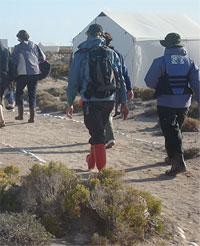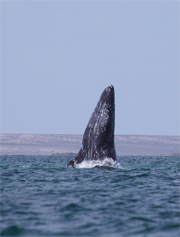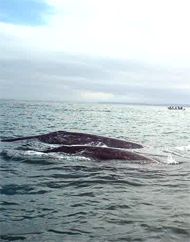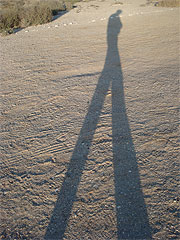Of Whales and Women
 We trudged along the sandy path lined with scallop shells, following it to the edge of the camp and down a narrower path leading to the beach. We were a symphony of sporting gear: our waterproof pants shooshing back and forth in rhythm with each step, our knee-high rubber wellies marching out a hollow gahlump-gahlump percussion as we crossed the sandy flats to the rocks where the pangas were moored. Each one took her turn sitting on the gunwale, swinging legs over into the small boat until six plus the guide were situated on the flat bench seats and Ranulfo, the driver – whose father was the first person to touch a whale in this lagoon – pushed off and drove out, away from the shore.
We trudged along the sandy path lined with scallop shells, following it to the edge of the camp and down a narrower path leading to the beach. We were a symphony of sporting gear: our waterproof pants shooshing back and forth in rhythm with each step, our knee-high rubber wellies marching out a hollow gahlump-gahlump percussion as we crossed the sandy flats to the rocks where the pangas were moored. Each one took her turn sitting on the gunwale, swinging legs over into the small boat until six plus the guide were situated on the flat bench seats and Ranulfo, the driver – whose father was the first person to touch a whale in this lagoon – pushed off and drove out, away from the shore.
A 5-minute open-throttled ride until we reached the point at the edge of the lagoon, where the boat slowed and stopped, radioing “Tico, Tico, Tico!” for permission to enter. Tico, guardian of the lagoon, squawked his okay on the radio and waved back to us from his chair on the shore. The panga motored forward and into the dark green waters of the lagoon.
This escape, a whale-watching trip to Laguna San Ignacio, Mexico, was the inspired idea of my friend the Fiesta Nazi, a woman who needs no excuse to abduct her gal-pals for a good adventure, and yet she used the occasions of a rather monumental birthday and International Woman’s Day as reasons to invite a gaggle of girlfriends from every stage of her life to join her in the Baja in search of gray whales. Imagine a remote camp on the beach with 18 wildish whale-smitten women. The days were sunny and slow, pivoting around patient excursions into the lagoon to watch for whales. Happy happy happy hour started at sunset and stretched through dinner and late into the night. Many of us, liberated from motherly duties, took advantage of these un-dutied days, as did those not encumbered with family appendages, equally happy for the leisure. One imagines that the crew at this camp – kind and most attentive – didn’t expect a pack of women to consistently stay up as late, drink as much beer and generate as much sexually innuendoed humor as we managed to stir up. Plus we were crazy about the whales.

“Look, eleven o’clock,” someone shouted, pointing just left of the bow. A football field’s length away, the shiny body of a gray whale thrust itself straight up out of the water. “That’s a spy-hop,” said our guide, José. Everyone in the boat fell silent, probably pondering what it would be like to be able to push more than a third of your own body weight vertically out of the water without touching the sea floor. “Why do they do that?” someone finally asked. José’s answer became one of the trip mottos: “Because they can.”
“Three o’clock!” All heads turned to starboard. About 15 meters from the boat, a 20-foot long gray whale dipped out and back into the water. Ranulfo turned the nose of the boat and inched forward respectfully, taking us to get a closer look. “That was the baby,” José said, “now look for the mama.”
Everyone sat upright, on vigil, heads left to right scanning the water, cameras poised. The sea held its breath like we held ours, until a long thick mammal came into view, submerged, hovering – maybe even teasing us – before breaking through the surface and baring her knuckled spine.
She was in no hurry. Her thick spotted body skimmed the water in first gear, turning slightly just before she disappeared, leaving only an odd rounded footprint into which the waves could not penetrate. Ranulfo cut the engine so we heard only the waves lapping against the wooden panga. We sat, frozen, for the longest, quietest minute. Just when I had given up, certain they had swum beneath us and far away, both whales, mama and  baby, sliced open the surface in tandem, gliding in slow-motion through the water only a few meters from our boat. The mother’s body was thick and spotted, decorated with patches of barnacles. The baby whale – José estimated it was a month old – was smoother, newer, no discoloring on the skin. It had not yet picked up the marks that scar and give character to an older whale, the markings that mamas (and women of a certain age) collect over time, the wear and tear and bumps and barnacles that come from navigating an ocean from one lagoon to another season after season.
baby, sliced open the surface in tandem, gliding in slow-motion through the water only a few meters from our boat. The mother’s body was thick and spotted, decorated with patches of barnacles. The baby whale – José estimated it was a month old – was smoother, newer, no discoloring on the skin. It had not yet picked up the marks that scar and give character to an older whale, the markings that mamas (and women of a certain age) collect over time, the wear and tear and bumps and barnacles that come from navigating an ocean from one lagoon to another season after season.
The timing of this trip was not uncomplicated. When I made the decision to attend, I did not know that I would spend three weeks away from home this winter, caring for my mother. I engaged in a serious debate with myself to decide if this trip was still doable. I was not sure I’d have the stamina. I wondered about the wisdom of a third transatlantic aller-retour in 6-week window of time. I was also a little bit afraid that escaping to a secluded camp with no technology to distract me would be too much of an opportunity to confront my grief. Running about and being busy is further protection from the pain that still feels so close, a long shadow just below the surface waiting to breach.
But De-facto and his mother offered their full support, so I hugged my little girls goodbye, again, and boarded the plane to find myself removed from the strain of the recent chain of events and enveloped in the rounded embrace of the best friends of one of my best friends: clever, accomplished, adventuring women, in abundant possession of wise words, crazy spirits and a good dose of humor; well keeled women unafraid to camp outside and live out loud.
On the other side of the lagoon, we cruised directly into the patch of birded water filled with flocks of gulls and terns and egrets, and the occasional pelican with his beak pressed shut as if keeping a secret. Some of the birds took wing as we sped by; others paid us no attention, perching nonchalantly on the surface of the water. Beside us, three dolphins danced in and out of the water like lords-a-leaping, keeping pace with the boat. Just ahead, a whale breached the surface of the lagoon, twisting and slapping the water with its fluke as it slowly dove back in. It felt as though the birds and whales and dolphins had opened a door to us, pulling us fully into their watery world. We were no longer observing the wildlife around us; we had joined it.

What a privilege to spend a string of days with nothing to do but pet a whale’s nose and look her right in the eye, go for long walks on the beach, eat fish tacos and drink shots of mezcal or cold cervezas from a continuously re-stocked ice-chest. Each day, a little of the weight of these last weeks was chipped away. Each day, a few salty tears fell back into the ocean. Each day, I felt a little more restored. I return to my world, hopeful.
Nothing makes up for the loss of one’s mother, but the healing company of so many compassionate middle-aged sisters sure helps. Like the mama whales, we’re all a little bit worn; we’ve collected the marks that build character. We’ve endured the wear and tear and bumps and bruises that come from caring and crying, from coaxing ourselves through the odd passages of life that test and jeer at us. We keep swimming forward with grace, navigating what life hurls at us, season after season, each one of us breaching and spy-hopping and dancing in the water in our own unique way, because we can.